
Macular degeneration – Causes, signs, and management
Macular degeneration, also known as age-related macular degeneration (AMD), is the primary cause of visual loss in adults over 50. It typically affects the macula—the central region of the retina that helps people see what’s right in front of them. The eye disorder interferes with one’s daily activities like driving and reading. But the good news is that timely treatment can help control its symptoms to improve the patient’s quality of life.
Causes
Experts do not know for sure what damages the retina, but they believe that a combination of genetic and environmental elements brings on macular degeneration. The following are a few factors that can increase one’s risk of developing the disorder:
Being 50 years or older
Having a family history of the condition
Being diagnosed with cardiovascular diseases like high blood pressure and cholesterol
Signs and symptoms
The signs and symptoms of macular degeneration include:
Blurred or distorted images, particularly in the central field of vision
Difficulty reading or recognizing faces
Dark spots in the middle of the eyesight
Changes in color perception
Slow recovery of sight after exposure to bright lights
Macular degeneration has two sub-types: dry and wet. The former is more prevalent and progresses gradually, while the latter is rare but can cause rapid and severe vision loss.
Treatment
Depending on the kind and severity of the condition, macular degeneration can be treated using various techniques. Among the most popular forms of treatment are:
Anti-VEGF therapy
It involves administering treatments to stop the development of abnormal blood vessels in the macula that can lead to vision loss.
Photodynamic therapy
Here, doctors administer light-sensitive compounds into the bloodstream. They then use a laser to activate those compounds, which destroys abnormal blood vessels.
Laser therapy
It involves using a laser to destroy abnormal blood vessels in the macula.
Natural remedies and foods
Some natural remedies and foods may help alleviate the symptoms of macular degeneration. These include:
Omega-3 fatty acids
Found in fish oil, omega-3 fatty acids may help reduce eye inflammation and slow the progression of macular degeneration.
Lutein and zeaxanthin
These antioxidants are present in high levels in the macula. So, eating foods rich in them, such as leafy green vegetables, may help protect the macula from damage.
Bilberry
This fruit contains anthocyanosides, which may help improve night vision and protect the retina from damage.
Ginkgo biloba
This herb has been shown to improve blood flow to the retina and may help reduce eye inflammation.
Vitamins and minerals
Studies indicate that specific vitamins and minerals, like zinc, copper, and vitamins C and E, can delay the advancement of macular degeneration.
It is important to note that natural remedies and foods should not be used as a substitute for doctor-recommended treatment but rather as a complementary approach to managing macular degeneration. The right management plan can help slow the condition’s progression and preserve eyesight. The earlier the disorder is diagnosed, the better it can be managed. So, one should inform an eye doctor of any changes in their eyesight as soon as possible.




